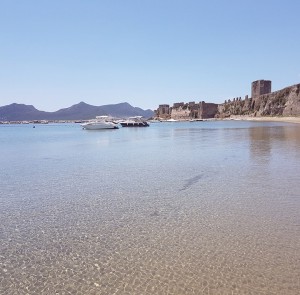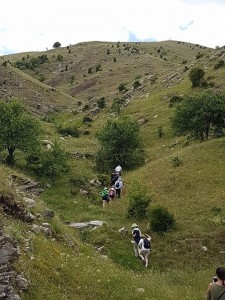June 13
In “The Crying Of Lot 49”, which I finished as we made our way up mountains, Thomas Pynchon defines a miracle as “an intrusion from another world,” and I haven’t stopped thinking about it since.
Back in Pylos: lying in bed, not sleeping—deathless; a mummy in a tomb of starchy linen—the alarm goes off, and I don’t move. I wait for the kinetic force of history to dam up and carry me along to the next point on the timeline without any personal effort, for events to build up and wash me away to the bathroom so I can get ready. This is dream logic; eventually I’m going to have to drip out of bed on my own.
History, which we’ve been studying so extensively through architecture—ruined, covered in graffiti—is a sort of dream. Like waking up and trying to remember every detail, but only having that bit about the beluga and your mother, we reconstruct entire lives, fathers, sons, civilizations. History exists in another world, below your feet, beneath Greece’s thin topsoil, on the top of Mount Lykaoin, somewhere in the Middle East. The ruins are firmly here, in the same universe as us, but history is only guesses, artifacts, rebuilt temples and tantalizing, nearly invisible glimpses at a past subconscious.
And, paradoxically, history (or rather, the causal relationships between events that make up history) appears rigid, inevitable. Our hindsight plays tricks on us, making it difficult to imagine the uncertainty, for example, of an Athenian at Salamis. They had no idea they were going to win, except the words of an oracle, which some Athenians interpreted in a completely different direction. For us, the Greeks were always going to win. X leads to Y which leads to Z.
History, or our understanding of history, is somewhere between a dream and carved in stone. History—and Thales would love this—is water.
For one, it’s everywhere. It’s easier to find history in Greece than it is to find potable water. Just look down while you walk and it’s inevitable that you’ll find a potsherd. But more than that, history is mutable. Each new piece of evidence alters our understanding, even if only slightly (okay, maybe not potsherds at this point, but for an archaeological virgin like me they’re still fascinating).
I lost my water bottle yesterday. I think about that as I force myself out of bed, reliving the dream I just had about the dead cockroach we saw in Delphi transposed (as if carried along by water) into the corner of our Pylos hotel room. In that dream I was running to the bathroom, obviously to get away from the roach. In the dream I had my water bottle.
But is it actually obvious? I only interpreted my dream movement from the bed to the bathroom as avoidance because it makes sense. In the dream there wasn’t any fear or disgust. I’ve applied waking logic to a dream, made a shortcut between two images, two pieces of evidence, two potsherds. How much do I not remember? How much is buried under Freudian stratigraphy? Does it matter that the dream was a repetition of the five or so times I got up during the night to cough out my lungs into the sink? How much history did Schliemann destroy when he dug for treasure, how much information was washed away? How much doubt am I adding through hindsight? How can I ignore the obvious castration symbolism of my water bottle, clutched close to my chest so the cockroach (obviously the Laius to my Oedipus) can’t get it?
So history is dreams which are potsherds which are history which is water. Good, glad we cleared that up. In the bathroom, I drown awful yellow phlegm and toothpaste down the drain. Just like my water bottle, gone. Swirling into Pylos’ sewers, through the pipes, dark and dirty, out of sight, out of mind; into another world, rats and who-knows-whats, a place you wouldn’t want a miracle from; the sea at Methoni, hammered gold; the sink, white and clean.
The thing about water in Greece is that, like history, it’s everywhere, and yet elusive. There are potsherds on the ground, and water stations at every site, but without a water bottle, without the knowledge to interpret bits of clay two thousand years old (another way the metaphor almost works; education helps bottle liquid history), you’re going to be left with nothing but dirt and thirst. Don’t even get me started about the way water interacts with history, how it erodes sites and influences the building of settlements.
Down old marble stairs that twist, into the land of bread and wi-fi, Panos stands, miracle in his own right—Did you see him avoid that building by two inches? Can you believe he bought us oranges? And where did that round of tequila come from? He holds my water bottle, tells me it was “magic” when I ask him how he got it. All he does it snap his fingers and smile, disappearing down the stairs.
He gets us up Mount Lykaion. He catches junebugs in mid air. I was sure, in that way we’re sure about the course of history, that I’d have to go out and buy another bottle. That is, until Panos intruded on my world—and I use intruded in the nicest possible way. Of course he knows the owner of the restaurant I left it in. Of course he does.





